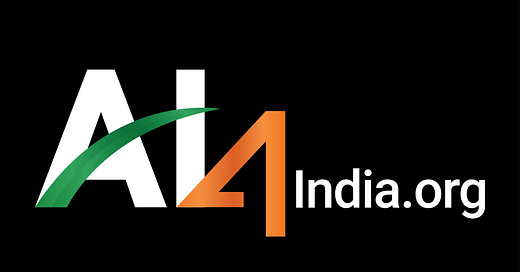The AI4India Weekly turns 25: A Close Look at Significant Strides Made in the Field of AI in India
The AI4India Weekly #25
As we mark the 25th edition of the AI4India Weekly newsletter, we take a moment to reflect on our journey and the significant strides made in the field of AI in India. This edition not only highlights the impactful initiatives we've covered so far but also delves into recent developments shaping the future of AI in our nation. Join us as we explore the launch of the #DataDaan campaign, insights on ethical data sharing, the establishment of Centres of Excellence in AI, and much more, all aimed at fostering an inclusive and innovative AI ecosystem. Together, let’s build a Viksit Bharat through the power of technology!
Data Daan - A Call to Action
The #DataDaan campaign, launched by AI4India.org, aims to democratize access to data as India works toward becoming a developed nation by 2047. This initiative seeks to create a vast, diverse pool of data from individuals, businesses, academic institutions, and government bodies, which is crucial for developing effective AI solutions that address the country’s pressing challenges in areas such as healthcare, agriculture, and education. By focusing on linguistic diversity, the campaign aims to develop AI models that can operate in multiple Indian languages, breaking down barriers to access and ensuring inclusivity. Through a collaborative approach that includes input from various stakeholders, the #DataDaan campaign not only facilitates data collection but also empowers citizens to contribute to India’s digital future. Ultimately, this movement invites all Indians to participate in building a repository of knowledge that will drive the nation's progress toward a Viksit Bharat, ensuring that technology serves as a force for good for all. Read More
Empowering India’s AI Future: Insights on Ethical Data Sharing
In a recent interview with CXO Today, the co-founders of AI4India emphasized the importance of ethical data sharing in propelling India's AI advancements, particularly in sensitive sectors such as healthcare, education, and finance. They highlighted that secure and transparent data-sharing practices are vital for developing robust AI solutions that prioritize privacy while enabling meaningful analysis. The discussion underscored that India's AI success relies on collaborative efforts between the public and private sectors, advocating for standardized ethical data practices to foster innovation while safeguarding citizens' rights. This approach aims to create AI solutions that address the country's unique challenges and support its long-term goals in AI governance and digital transformation. Read the full interview here
India’s Centres of Excellence (CoE) in AI: Catalyzing Innovation Across Agriculture, Healthcare, and Smart Cities
India's newly established Centres of Excellence (CoE) in AI, spearheaded by premier institutions like IIT Ropar, IIT Delhi, AIIMS New Delhi, and IIT Kanpur, are set to drive transformative change across critical sectors such as agriculture, healthcare, and urban development. The CoE in Agriculture will utilize AI to enhance farming practices through real-time guidance based on extensive data, promoting sustainability and biodiversity. In Healthcare, the collaboration between IIT Delhi and AIIMS aims to advance disease prediction, diagnostics, and accessibility through AI-driven insights, particularly in clinical trials. Meanwhile, IIT Kanpur's CoE for Sustainable Cities will leverage AI for smarter urban planning and resource management, optimizing costs and improving infrastructure. Together, these initiatives not only aim to enhance the Indian AI ecosystem but also promise significant benefits for communities globally, paving the way for sustainable solutions in vital sectors. Read More
Indian AI Needs Publicly Accessible Datasets
by Shashi Shekhar Vempati
Data is often referred to as the new oil, yet India's AI development is stymied by a lack of publicly accessible datasets that reflect its diverse socio-economic and cultural landscape. While AI has the potential to transform various sectors—from healthcare to agriculture—current models, often trained on predominantly Western datasets, struggle to perform effectively within the unique Indian context. To harness AI’s full potential, India must create robust, localized datasets that can inform innovations tailored to the specific needs of its populace. By encouraging large organizations, government bodies, and NGOs to contribute their data to a common public repository, we can foster an environment of creativity and technological advancement. This open data ecosystem would empower startups and researchers to develop solutions that resonate with Indian users, positioning the nation as a competitive player in the global AI landscape. Initiatives like 'AI for India' are advocating for such data sharing, and now is the time to unify government, corporates, and civil society in this crucial effort to enhance AI innovation and drive progress toward a Viksit Bharat. Read More
Clash of the Titans: The Battle for AI Supremacy
by Omkar Patil
The competition among tech giants in the AI space is not merely about who can create the most advanced models; it's also a battle for influence and direction in the future of technology. As OpenAI, Google, and Meta race to refine and deploy Large Language Models, the stakes have never been higher. Each company's approach reveals distinct philosophies: OpenAI's commitment to pushing the envelope with models like GPT-4 and their recent release of GPT-4 Omni, which merges vision, text, and speech capabilities, illustrates a bold strategy to redefine user interaction. Meanwhile, Google's methodical rollout of innovations across its ecosystem reflects a desire to integrate advancements seamlessly into everyday tools, ensuring that their vast user base continues to engage with their offerings. As these titans clash, their decisions will shape not only the technological landscape but also the ethical and societal implications of AI, raising critical questions about safety, governance, and the future of human-AI collaboration. Read More
AI Applications – How to make AI work for people, corporations and a Viksit Bharat
by Alok Agrawal
The potential of AI to enhance our lives, streamline processes, and drive innovation cannot be overstated. However, to truly leverage this technology, we must shift our focus from merely viewing AI as a tool for tech-savvy individuals to recognizing its capacity as a transformative force for everyone. By identifying and developing AI applications that address routine tasks or extend beyond human capabilities, we can democratize its benefits across various sectors. From office assistants that automate mundane administrative duties to healthcare tools that revolutionize diagnostics, the applications of AI are vast and varied. As we explore these possibilities, it's essential to ensure that AI serves as an enabler, empowering individuals and organizations to achieve more, ultimately contributing to a Viksit Bharat where technology enhances every aspect of life. At AI4India, we are committed to collaborating with AI companies to foster innovative applications that align with this vision, making AI accessible and beneficial for all. Read More
Integrating AI into Managing Patient Therapy Support
by Sanat Mohanty and Omkar Patil
As the medical field continues to evolve, the integration of AI in managing patient therapy support emerges as a pivotal advancement. The effectiveness of treatments for various conditions, including autoimmune disorders and cancers, is increasingly understood to be influenced by genetic factors and individual patient histories. Research has shown that factors such as race and genetic mutations can significantly affect therapy outcomes, leading to potential complications and adverse reactions when less effective treatments are prescribed. The future of biopharmaceuticals lies in personalized medicine, where therapies are tailored based on omics data, aiming to optimize treatment efficacy while minimizing costs. However, the challenge remains in capturing the unique genetic variations and disease profiles of the Indian demographic, as many current drug development models do not adequately address these specificities. By aggregating diverse data sources—encompassing patient histories, clinical reports, and quality-of-life assessments—AI-driven models can offer crucial insights into therapy selection and standardize care that is relevant to the Indian population. This innovative approach not only enhances patient outcomes but also addresses the economic burdens associated with chronic diseases, paving the way for more effective and sustainable healthcare solutions in India. Read More
Government Puts Wikipedia on Notice for Alleged Bias and Inaccuracies
In a significant move, the Indian government has issued a formal notice to Wikipedia, citing numerous complaints of bias and inaccuracies in its content. The notice raises concerns about the editorial control exercised by a limited group of contributors and questions whether Wikipedia should be classified as a publisher rather than a mere intermediary. This action follows a Delhi High Court ruling, which criticized Wikipedia's open editing model as "dangerous," highlighting the risks of disseminating inaccurate or defamatory information, particularly on sensitive topics.
The implications of this issue extend beyond Wikipedia itself. Wikipedia data has been widely used in training large language models (LLMs), which form the backbone of many AI applications. If the core data is biased or inaccurate, these flaws could permeate into AI models, potentially introducing systemic bias against India in tools such as search engines, virtual assistants, and other AI-driven platforms. This raises serious concerns about the integrity of AI outputs and underscores the critical need for reliable and unbiased training data in developing robust, fair, and globally applicable AI systems.
Regulate AI Use, Not the Technology
As AI continues to advance, experts are advocating for a regulatory approach that focuses on its use rather than the technology itself. Instead of a one-size-fits-all framework, a sector-specific strategy is recommended, where AI applications are regulated based on their context. Jensen Huang, CEO of Nvidia, emphasized this at a recent ET Conversations event, suggesting that AI should be regulated within the domain it is applied—be it in accounting, law, or healthcare. This view is gaining traction among industry leaders who believe that overly centralized regulations could hinder innovation and adaptability, especially in a fast-evolving field like AI.
India, currently focused on building its AI capabilities, is leaning toward a flexible regulatory framework. While existing laws on data privacy and cybersecurity provide a foundation, experts argue for a more nuanced approach. A horizontal framework from the IT Ministry could establish broad principles of responsible AI, with sectoral regulators tailoring specific rules to the unique challenges of their domains. This balance aims to encourage innovation while ensuring that AI’s risks are managed appropriately across various industries.
In The News
OpenAI Introduces SearchGPT - OpenAI's new SearchGPT feature aims to challenge traditional search engines like Google, promising a transformative shift in how users access information. Read More
AI Enhancements in Su-30MKI Upgrade - The Indian Air Force is incorporating AI into its Su-30MKI fighter jets, collaborating with IIT Mumbai to pilot cutting-edge projects. Read More
The Five Pillars of AI Governance in India - An insightful opinion piece outlines key principles guiding India's approach to AI governance, balancing innovation with ethical considerations. Read More
Google's Leap into 3D Imaging in Healthcare - Google advances in AI-driven healthcare with 3D imaging technology, raising questions about the future role of radiologists. Read More
Anthropic's Advancements with 3.5 Models - Anthropic introduces its 3.5 models, highlighting significant improvements in AI capabilities and energy-efficient computing. Read More
#DataDaan - Donate for a Digital India
Aligned with the IndiaAI mission and the efforts from MeitY to ensure the availability of AI-usable data across govt, the #DataDaan campaign by AI4India.org is inviting participation from individuals and organizations to contribute valuable data for AI development in India. This initiative aims to gather diverse datasets to enrich the national data repository, supporting innovation across various sectors. We encourage everyone to read the detailed white paper on the campaign - https://bit.ly/DataDaan and fill out the form - http://bit.ly/3XfxD3H to contribute to this transformative effort.
We’ve also created a podcast on #DataDaan using Google’s NotebookLM, which transforms documents into engaging audio conversation. Listen to the podcast below!
This concerted push to make AI work for India highlights how data accessibility can unlock the potential for large-scale socio-economic transformation, driving innovation, and ensuring India’s competitive edge in the AI-driven global economy.
NOTE: The views expressed by the authors are their own. AI4India as a forum does not endorse any comments on specific brands, products, platforms or companies.
Join our AI4India.org forum to be a part of the AI revolution in India by visiting our site now.
Follow us on our X and LinkedIn to receive interesting updates and analysis of AI-related news








